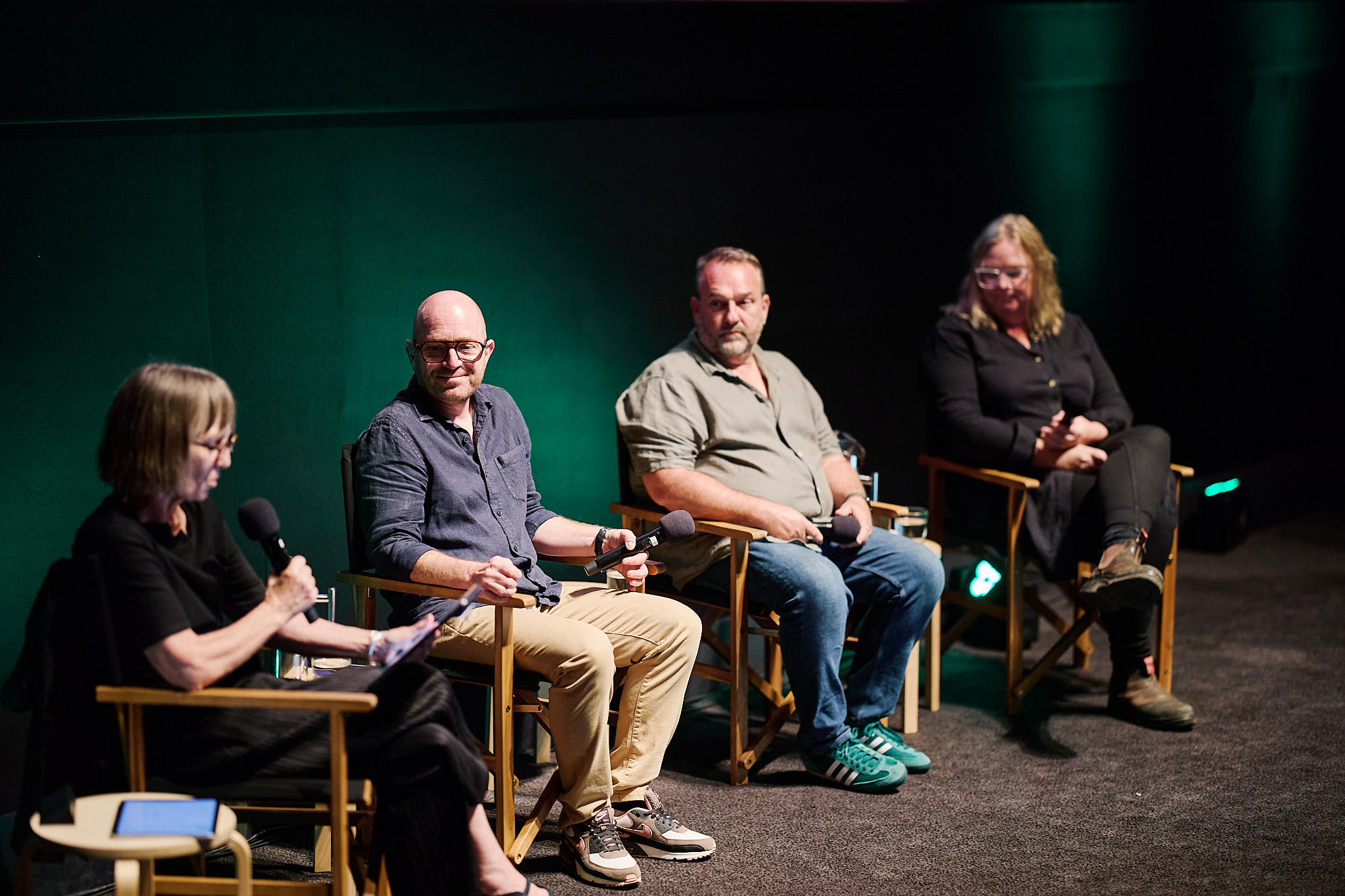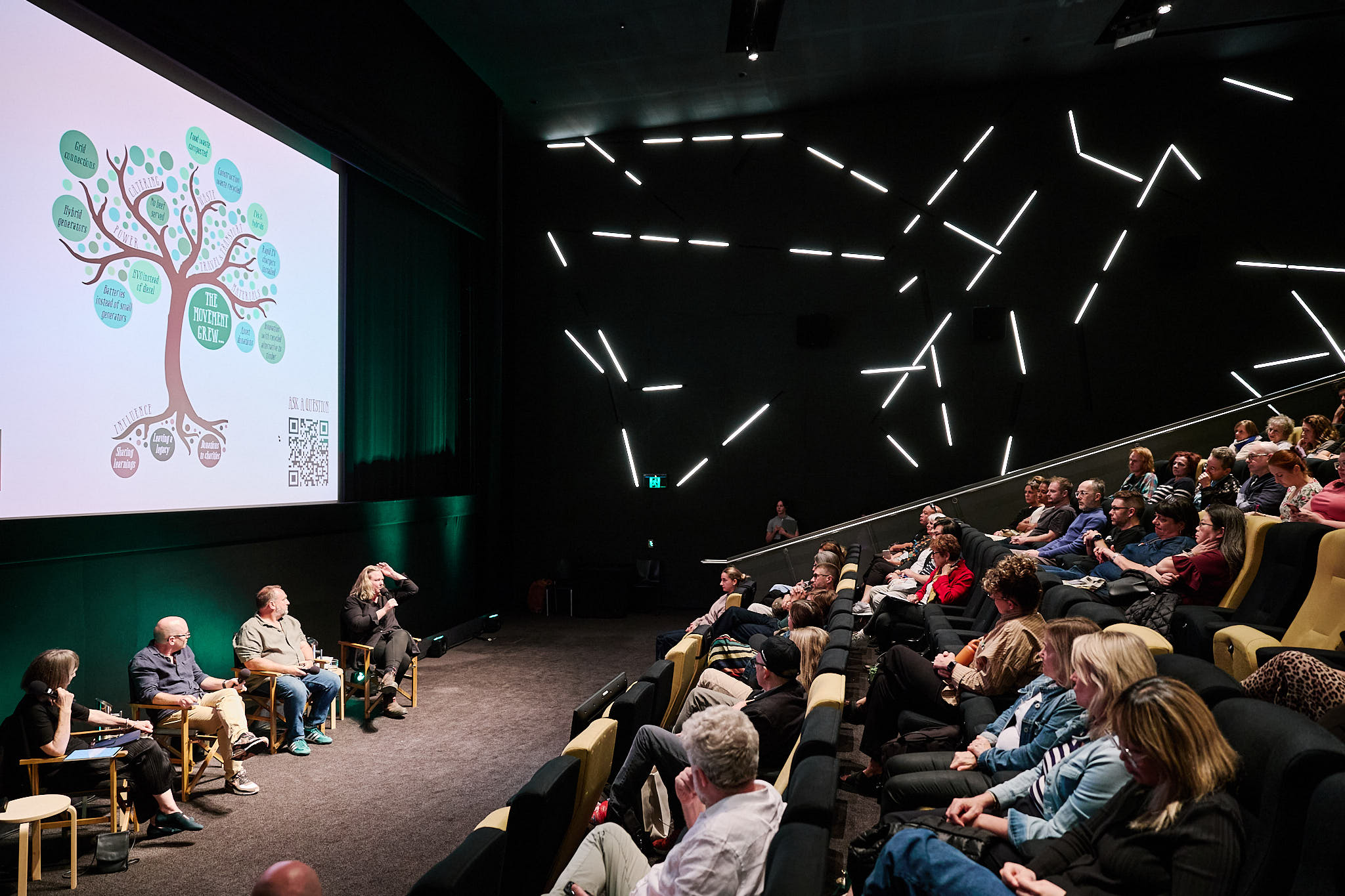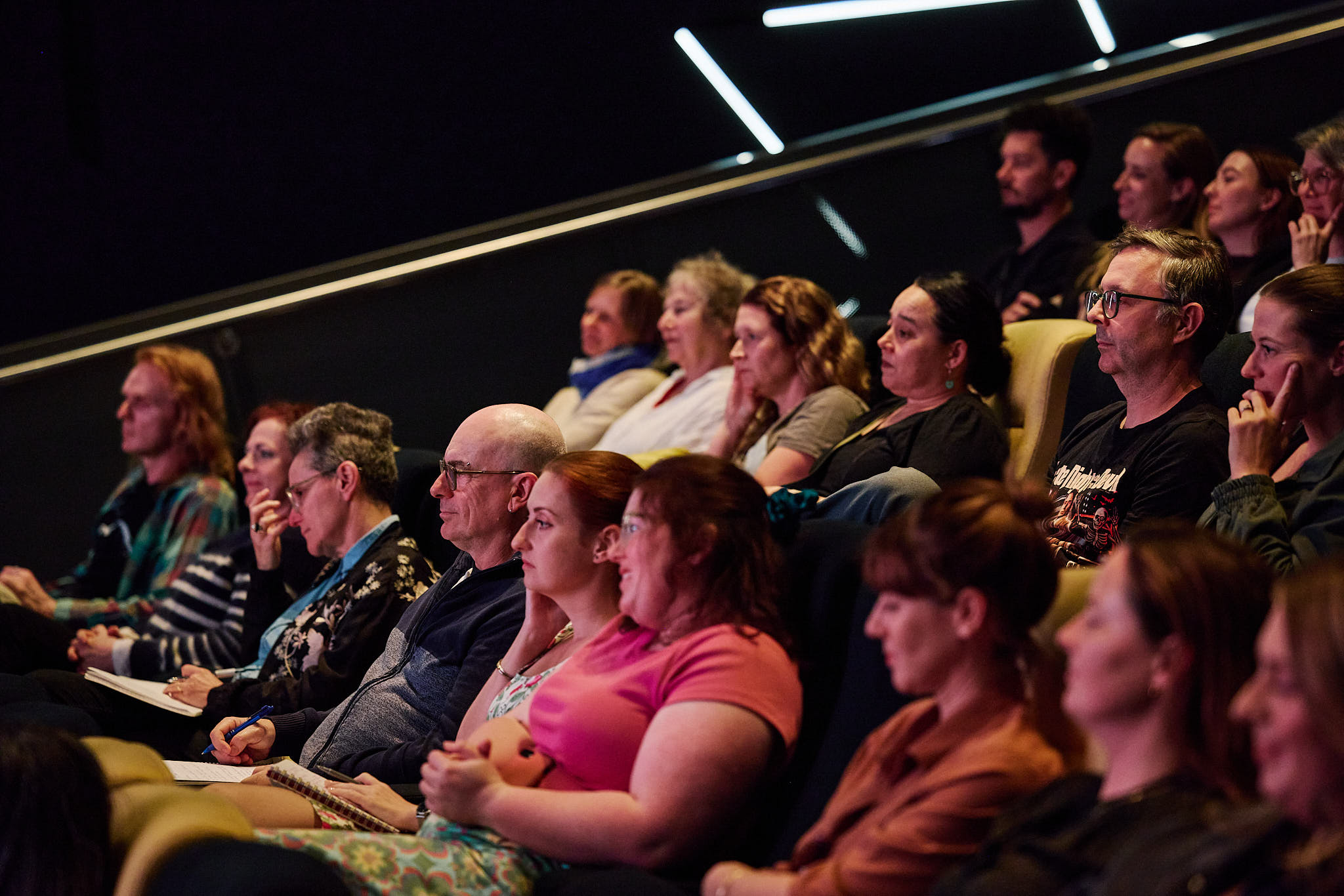News
SUSTAINABLE ACTION BEHIND THE SCENES ON ALL HER FAULT
 Helen Panckhurst (Head of Production at Matchbox Pictures), Paul Walton (Unit Production Manager), Andy Pappas (Supervising Unit Manager), and Maxine Dennett (Supervising Art Director) made up the panel to discuss sustainable production. Photo by Daniel Mahon.
Helen Panckhurst (Head of Production at Matchbox Pictures), Paul Walton (Unit Production Manager), Andy Pappas (Supervising Unit Manager), and Maxine Dennett (Supervising Art Director) made up the panel to discuss sustainable production. Photo by Daniel Mahon.
The production leadership team on VicScreen-supported drama series, All Her Fault, set out to introduce sustainable practices during their 19-week Melbourne shoot, and hope to spark a new culture of sustainability within Victoria’s screen industry.
VicScreen’s third screen industry masterclass has shone a spotlight on sustainability practices in the screen industry; facilitating a discussion about incorporating eco-friendly solutions into every stage of the production pipeline.
Helen Panckhurst, Head of Production at Matchbox Pictures, moderated the panel including All Her Fault heads of departments: Andy Pappas (Supervising Unit Manager), Maxine Dennett (Supervising Art Director) and Paul Walton (Unit Production Manager).
All Her Fault is produced by Carnival Films with Australian-based Matchbox Pictures providing production services, both of which are part of Universal International Studios, a division of Universal Studio Group. The production participated in the NBCUniversal Sustainable Production Program dedicated to reducing the environmental impact of film and TV productions across the company.
The panel discussion highlighted the key sustainability initiatives on the series including using a fleet of hybrid and electric cars, installing an electric vehicle (EV) fast charger at Docklands Studios Melbourne, and becoming the first Australian production to source and utilise hydrotreated vegetable oil (HVO) for unit base generators, avoiding greenhouse gas emissions compared to conventional diesel. These combined sustainability efforts allowed the production to save on fuel and other budgeted costs.
The panel also emphasised the importance of leadership, crew engagement, building community pride and establishing pathways for continuous improvement in sustainable practices to an audience of approximately 80 screen industry professionals who gathered at ACMI.
“Sarah [Snook] planted a seed,” Unit Production Manager Paul Walton explains. “She said that she wanted – as part of her deal – to be picked up in an electric vehicle, which sounds really simple. But she lit the blue touchpaper…that was the starting point.”
For Walton, and many other screen industry veterans, seeing the excess and waste that often occurs on film and television sets had bothered him for years. “We've all wanted to do things in a better way for such a long time…and we've all got within us that ‘better way’ and that solution. The key thing on this show was the leadership. We needed to create a safe space for people to be brave. And that's exactly what the leadership team did from the beginning. They gave us permission to get it wrong.”
 Members of the All Her Fault leadership team discussing sustainable production. Photo by Daniel Mahon.
Members of the All Her Fault leadership team discussing sustainable production. Photo by Daniel Mahon.
Helen Panckhurst observed that it’s often the line producer or unit production manager who advances the tone for how sustainability practices are adopted on set. “You need at least one of them [a line producer or UPM] who is really dedicated to doing something sustainably, because if you can't get that person who's dealing with the budget to see it as a priority, it becomes really difficult.”
Supervising Unit Manager Andy Pappas admits he was faced with a lot of nervousness at the outset of production with the challenge of switching to newer technologies, including powering the unit base with hybrid generators (which run on battery power with a fuel-powered engine to recharge when needed). “I was thinking, is it going to fail at a crucial time in the morning, such as when you've got cast in the chair? I figured it wasn’t going to work easily, but it did.” Eventually, however, the team was running the hybrid generators off grid power and recharging the batteries during quieter times of the day. “For six weeks, we didn’t use any fuel in the unit base generator.” Pappas says. “We went from saying, ‘this will never work.’ To, ‘how do we make it work?’ To, ‘oh, this is working!’ Walton added.
In addition to the support of leadership, the success of this program was a result of hiring a dedicated Eco-Department, led by film and TV sustainability consultancy Picture Zero, to support the cast and crew in their sustainability goals. The sustainability plan focused on five key areas: travel and transport, power, materials/assets, catering, and waste management. The Eco-Department met with Heads of Department weekly during prep to discuss their aspirations and build a robust sustainability plan – the Eco-Department continued to meet throughout the shoot, which helped keep the production’s sustainability targets on track.
 A crowd of industry professionals gathered at ACMI to learn more about sustainability production practices. Photo by Daniel Mahon.
A crowd of industry professionals gathered at ACMI to learn more about sustainability production practices. Photo by Daniel Mahon.
Art Director Maxine Dennett emphasised that most people working in art departments on film and TV sets already held sustainability quite close to them. “They value things. They value where things come from, and they value where things go.” The art department had already adopted recycling practices, however the head of production emphasising sustainability as a priority shifted the responsibility of each crew member finding solutions for waste management and made it a collective effort.
In an effort to pilot eco-friendly materials for set building, the art department engaged with Melbourne-based company Main & Frank Studio, a creative practice working on ecological projects across art, architecture, design, landscape and manufacturing. “This was very exciting to do proper R&D,” Dennett says. “The resources in Australia are often pushed to the limit that we don't get to do much R&D anymore. So, this was very exciting…and we took major steps towards finding some comparable materials.” The team also engaged with Smart Recycling, a local vendor specialising in recycling commercial and construction waste. At wrap, 95% of waste in the art department was diverted from landfill and Smart Recycling sorted through over 40 tons of waste to maximise material recovery. Dennett adds, “Also, their bins are about 45% the cost of a normal waste bin. So, our waste bill was hardly anything.”
Change is always challenging, especially when teams are under pressure, however, the leadership team was met with overwhelming support from cast and crew on All Her Fault to embrace sustainability and tackle any roadblocks along the way with curiosity and a can-do attitude. “Crew is the best resource you've got, listen and they'll give you the answers,” Walton said.
Learn more about sustainable production practices and how VicScreen is playing its part as a seed funder and a founding member of Sustainable Screens Australia (SSA) – a membership-based organisation focused on reducing the environmental impact of the Australian screen industry.